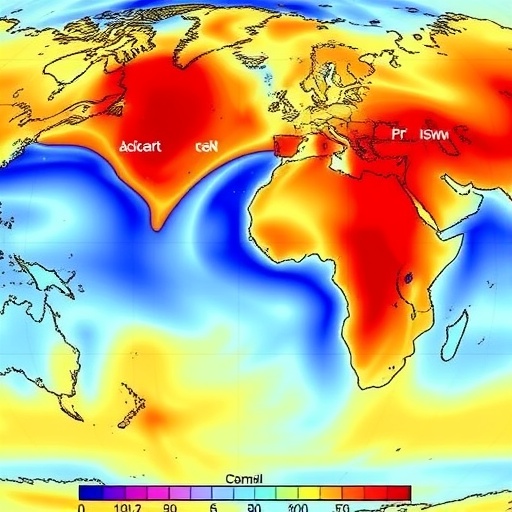Recent research has brought to light a concerning phenomenon in the Equatorial Atlantic region, where mid-depth warming indicates a potential slowdown in the Atlantic Meridional Overturning Circulation (AMOC). The AMOC is a crucial component of the Earth’s climate system, acting as a conveyor belt that transports warm, salty water from the tropics to the North Atlantic, and returning colder, denser water southward. This circulation plays a significant role in regulating global climate, influencing everything from sea levels to weather patterns.
According to a recent publication by researchers Ren, Xie, and Peng, this mid-depth warming is not just a transient event but could signify a broader, long-term trend. Their findings have profound implications for understanding how climate change is reshaping the ocean’s currents and, by extension, our planet’s climate. The researchers utilized an extensive array of data, including ocean temperature profiles and climate models, to identify the signals of warming at specific depths in the Equatorial Atlantic.
The research underscores the complexity of ocean dynamics and their interconnectivity with atmospheric conditions. As greenhouse gas emissions rise and global temperatures increase, the impact on ocean currents becomes ever more significant. The mid-depth warming identified in the study illustrates how these changes can reverberate throughout the planetary system, affecting not only marine ecosystems but also the atmospheric patterns that influence weather across the globe.
The researchers suggest that the alterations in the AMOC due to this warming could lead to shifts in rainfall patterns, with significant consequences for agricultural regions dependent on consistent weather conditions. An alteration in the AMOC may risk destabilizing climate systems, leading to extreme weather events and altering the distributions of species in both terrestrial and marine environments.
Furthermore, the impact of this mid-depth warming may extend beyond the Atlantic Ocean, potentially influencing global climate systems. For instance, changes in ocean currents can affect the El Niño-Southern Oscillation, which is a key driver of weather patterns in the Pacific and beyond. The implications of such interconnectivity are profound and warrant further investigation as climate science continues to evolve.
The role of advanced technologies in understanding these phenomena cannot be overstated. The use of high-resolution models and satellite data has enabled researchers to capture these subtle changes in ocean temperature and circulation patterns. This technological advancement allows for better predictions of future climate scenarios and prepares societies for the challenges that lie ahead.
Public interest in climate change has surged in recent years, and research like this plays a critical role in informing public discourse and policy. Awareness of phenomena such as the slowdown of the AMOC due to mid-depth warming can push for greater action in mitigating climate change impacts. The findings from this research highlight an urgent need for global collaboration to address the outstanding challenges posed by climate disruptions.
As sea levels rise and temperatures continue to fluctuate, understanding how these interconnected systems behave becomes vital. The research published in “Communications Earth & Environment” is a stepping stone towards greater clarity on these topics. It brings researchers one step closer to unraveling the complex tapestry of oceanic and atmospheric interactions that govern Earth’s climate.
In light of these findings, it becomes increasingly crucial for governments, scientists, and the public to engage in discussions on climate resilience and adaptation strategies. Those in vulnerable regions may need to prepare for agriculture shifts and increased incidences of extreme weather, necessitating innovative approaches for resource management and sustainability.
Moreover, educating the next generation about the importance of ocean currents and climate change is essential. Schools and educational institutions have a role to play in fostering awareness and inspiring future scientists who will continue this vital work. The challenges we face in the context of climate change make it clear that fostering a new generation of environmental stewards is not just an option, but a necessity.
In summary, the recent study regarding mid-depth warming in the Equatorial Atlantic serves as a stark reminder of the intricate relationships between oceanic processes and climate. The potential slowdown of the AMOC poses significant risks to both human and environmental systems. As we anticipate the cascading effects of these changes, this research serves as an urgent clarion call for action and further investigation in the pursuit of understanding and tackling climate change.
As the global community grapples with the reality of a warming planet, it becomes imperative that we heed the warnings of scientists. The insights gleaned from this research illuminate the paths we must take to safeguard our climate, our natural ecosystems, and ultimately, our shared future.
In facing the reality of such profound changes, we are presented with both challenge and opportunity—an opportunity to reconnect with our planet, to reshape our societies, and to work collectively towards sustainable solutions that honor the balance of nature.
Subject of Research: Climate Change Impact on Atlantic Meridional Overturning Circulation
Article Title: Equatorial Atlantic mid-depth warming indicates Atlantic meridional overturning circulation slowdown
Article References:
Ren, Q., Xie, SP., Peng, Q. et al. Equatorial Atlantic mid-depth warming indicates Atlantic meridional overturning circulation slowdown.
Commun Earth Environ 6, 819 (2025). https://doi.org/10.1038/s43247-025-02793-1
Image Credits: AI Generated
DOI:
Keywords: Climate change, Atlantic Meridional Overturning Circulation, ocean dynamics, mid-depth warming, global climate system.




